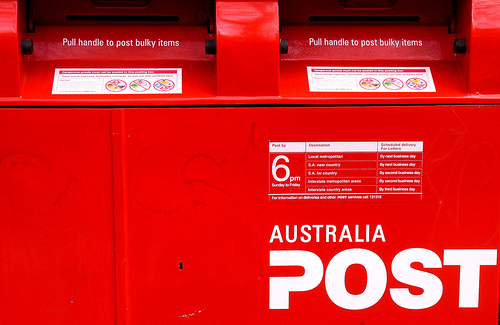Aussie Post champions online retail: NRA

The National Retail Association (NRA) has accused Australia Post as playing a key role in supporting foreign online retailers at the expense of local retailers.

(Australia post image by Les Haines, CC BY 2.0)
The NRA, which represents the Australian retail industry, made the accusations in its supplementary submission (PDF) to the Productivity Commission's public inquiry into the economic structure and performance of the retail industry, which was accepted just two days before the draft report was released.
It examines previous submissions made by other organisations during the submissions period, including eBay, CAPEC (Conference of Asia Pacific Express Carriers) and Visa. However, it spends a considerable portion of its efforts on Australia Post, claiming that imports classified by Australia Post as low value or "low risk" are not subject to the same screening and risk assessments as other imports. Instead of being put on a conveyor belt to be x-rayed and checked, they are sent directly through to Australia Post to deliver under a memorandum of agreement with the Australian Customs Service. This "streamlining" of the process had played "a key facilitative role in the growth of foreign online retailers at the expense of Australian online and Australian bricks-and-mortar retailers," it said.
The NRA said that Australia Post should be required to report extensively on the nature of goods and the value of goods entering the country, without any formal clearance and without any significant security assessment. It also said that it would be helpful if Australia Post disclosed how many items it classifies as low risk, and the criteria for doing so.
Yet, when ZDNet Australia contacted Australia Post, the company said that Customs performs risk assessments.
"All risk assessments and screening are conducted by Customs and Australian Quarantine and Inspection Service as part of their security and quarantine requirements. These border agencies determine whether a particular postal item is 'low risk' or below the low-value threshold," the carrier said.
The retail association also noted Australia Post's admission that it was losing money due to online sales, because it wasn't getting enough money from international postal agreements for the delivery of items coming into the country.
The association asserted that because Australia Post is "an Australian government business enterprise, wholly owned by the Australian Government and the Australian people", it should be held accountable for supporting foreign online retailers.
"The effect of these arrangements is that Australian taxpayers, including Australian retailers, are subsidising the transport cost of items exported to Australia by foreign online retailers," it said.
Australia Post countered that it wasn't taxpayer funded, but is rather a self-funded business that has to operate in its best commercial interests.
The NRA also picked up on Visa's refusal to alter its transaction systems in order to accommodate Australia's GST system, on the basis that it doesn't make exceptions globally.
The NRA's submission accused Visa's lack of involvement in the GST issue as self-serving, stating that Visa's submission fails to disclose that it has a financial gain on the current status quo due to the fees that it charges on international transactions.